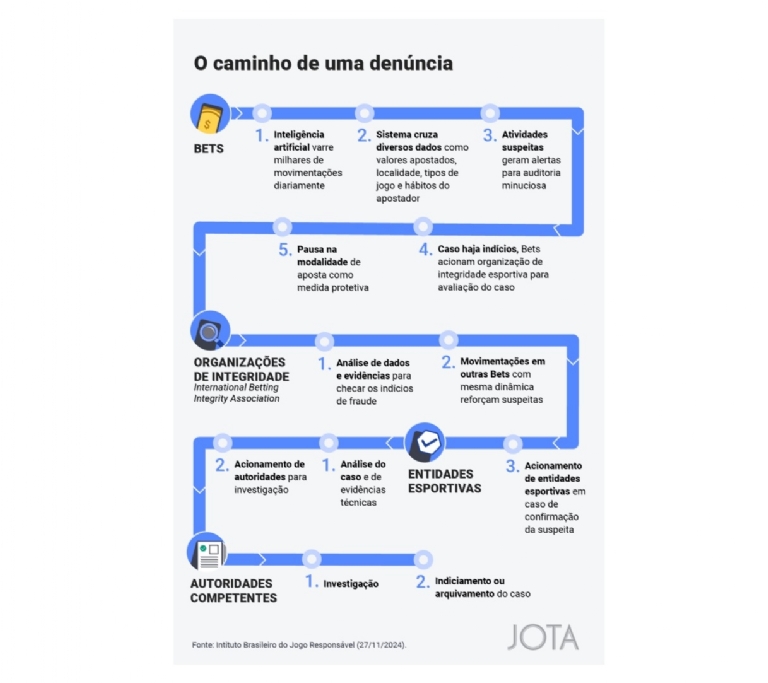

Recent cases of football players investigated for allegedly forcing yellow cards to manipulate results and influence the online betting market spark intense debates on individual conduct bets.
The solution proposed by some authorities, including parliamentary inquiry committees (CPIs) on betting currently underway in Congress, is to ban this type of betting.
For the Brazilian Institute of Responsible Gaming (IBJR), however, this would not solve the problem and could push bettors toward illegal companies that operate without any oversight.
“Prohibiting specific betting modalities will not end match-fixing. Fraudsters will seek the illegal market to continue this harmful practice, which damages sports, bettors, and society as a whole,” says IBJR President André Gelfi.
“That’s why regulation is essential to ensure all protection mechanisms are in place to curb illegal activities. We trust in the effectiveness of the regulation set to take effect on January 1,” he adds.
The IBJR represents 75% of Brazil’s online sports betting market, consisting of companies with global operations and extensive experience in mature markets like the United States, the United Kingdom, and Australia.
According to the institute and its associates, regulating the sector is the only way to combat fraud and ensure transparency, security, and sports integrity.
New rules
Starting January 1, 2025, sports betting companies will be required to adopt a new domain suffix (.bet.br) on their websites, signaling their legitimacy to operate in Brazil under existing regulations. This measure will help bettors identify and distinguish licensed companies from illegal operators.
Betting companies will also be required to implement facial recognition tools to prevent minors under 18 from placing bets. Additionally, they must provide mechanisms for bettors to set maximum limits on playtime and financial losses. Other measures to prevent abusive behavior, curtail addiction, and combat compulsive gambling have already been introduced, such as blocking the use of credit cards.
“The regulation has been reinforced with oversight measures implemented by the Ministry of Finance, which has partnered with international organizations dedicated to sports integrity protection, such as the International Betting Integrity Association (IBIA), of which IBJR and its member companies are affiliates,” says Rafael Marchetti Marcondes, IBJR’s Legal Director.
“With these cooperation agreements, the Ministry of Finance’s Secretariat for Prizes and Betting will have new monitoring and intelligence capabilities to identify suspicious activities in matches held in the country,” he emphasizes.
Actions by IBJR and its associates
The Brazilian Institute of Responsible Gaming (IBJR) aims to develop a sustainable, secure, and reliable online betting ecosystem that generates benefits for bettors, the sector, and society as a whole.
Aligned with this mission, its member companies have been proactive in combating match-fixing and other forms of fraud in the betting environment. As illustrated in the following chart, they leverage their experience in mature international markets and advanced technology as key allies.

Through artificial intelligence and data monitoring systems, all financial and gaming transactions are closely tracked. If an inconsistency is detected, an alert is triggered for further investigation.
Other evaluations include irregularities in registration data, payment methods and volumes, betting locations, player habits, and financial capacity.
All daily bets are also scanned to detect movements that may constitute some type of manipulation. These include concentration of bets in a specific situation of a single match, people placing non-standard bets simultaneously on several platforms, and the sudden creation of profiles that make large movements.
When member companies detect suspicious activity, they share the data with the International Betting Integrity Association (IBIA), which conducts thorough investigations. If evidence of fraud emerges, the case is reported to the relevant sports authority, which then engages the appropriate legal entities.
“The regulation introduces significant measures to ensure transparency and fairness in betting. We are always ready to collaborate with the government, drawing on the experience of our associates. It’s crucial to combat illegal companies that do not adhere to strict supervision standards and anti-fraud measures. Illegal practices have no place in the fair and responsible gaming environment we strive to create,” concludes Gelfi.
Source: Jota